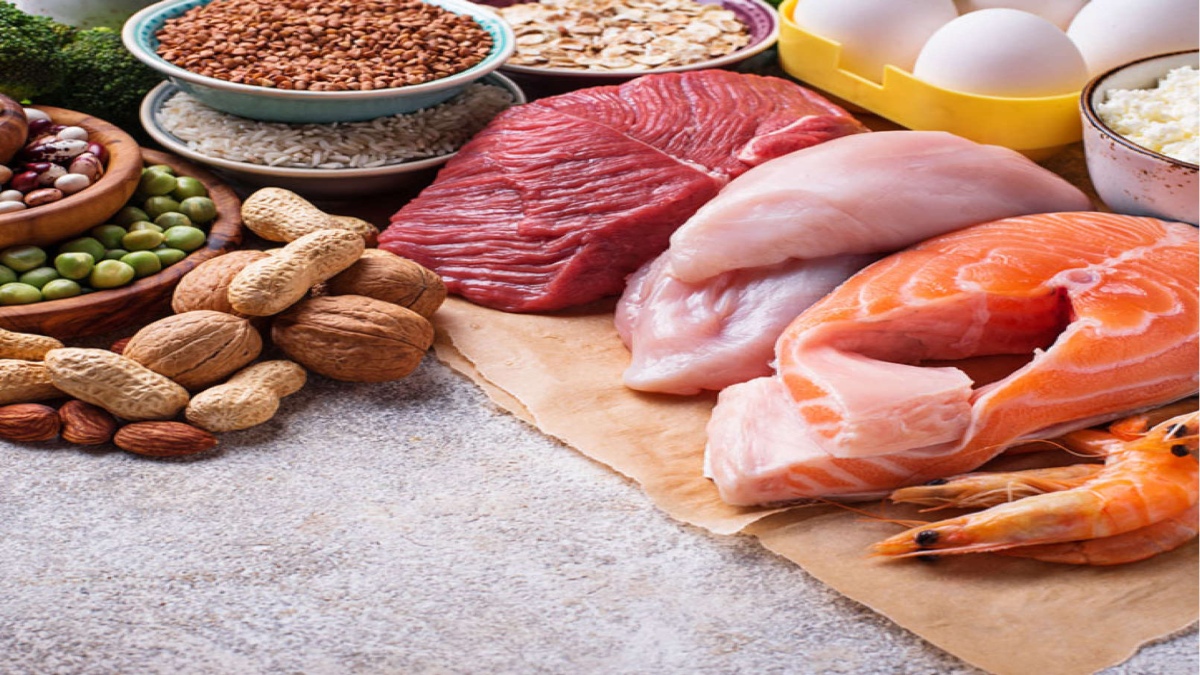The adage “We are what we eat” is true in each sense of the word. A balanced diet is essential for our body to receive good nutrition, build resistance, keep up our immunity, fight infections, and help in the healthy regeneration of our body’s cells. Protein deficiency can cause slow or stunted growth in children and young adults, oedema (fluid build-up in the body), swollen bellies in malnourished children, low immunity, weak bones, and increased risk of fractures, brittle nails, hair fall, and loss of muscle mass. National Nutrition Week 2020 is celebrated from 1 to 7 September and the purpose is to create awareness about good nutrition and health.



A balanced diet consists of the correct proportion of proteins, carbohydrates, vitamins, minerals, and fat. It is necessary to understand their role in good nutrition and be aware of their sources.
PROTEINS
Proteins are made up of about 20 amino acids and are the building blocks of our body necessary for growth and development. Amino acids have been categorised into three groups:
•Essential amino acids – The body cannot produce these on its own, and they must be sourced from food
•Non-essential amino acids – These are made by the body from essential amino acids when the body breaks down protein for assimilation
•Conditional amino acids – These are required at the time of illness to fight infection
Proteins perform the following functions:
• Growth, repair, and regeneration of the body’s cells and make a strong base for muscles and bones
• Aid in the adequate secretion of hormones and enzymes for body functions
• Build immunity and fight infections
It is important to get an adequate amount of protein from the diet on a daily basis, and know its sources from food. The body’s protein intake depends on age, weight, and gender, and health status. The daily recommended protein intake for a normal healthy person is 10% to 35% of the total calorie needs (for example, the intake of 100 gm of protein daily for a person consuming 2000 calories a day would ensure a healthy amount of 20% protein in his diet). It is important to know that the body cannot store protein and any excess will be excreted out by the system. Therefore, it is essential that every meal consists of a small portion of proteins.
SOURCES OF PROTEIN IN THE DIET
•Animal sources – Meat, seafood, eggs, poultry, dairy products like milk, cheese, curd, yoghurt
•Lean meats – mutton, beef, buffalo meat, lamb, pork, veal with fat trimmed off
•Poultry – chicken, turkey, goose fowl, duck with fat trimmed off
•Dairy – milk, eggs, cottage cheese, curd, yoghurt
•Seafood – fish, prawn, crab, lobster, shellfish, clam, oyster, mussels
•Plant Sources – Pulses, legumes, beans, tofu, green vegetables
•Beans – French beans, kidney beans, black beans, red beans, flat beans, split peas, lentils (all Dals), Bengal gram, chana (white chickpeas)
•Green leafy vegetables – spinach, cabbage, soy
•Nuts and seeds – almond, walnut, peanut, hazelnut, and sunflower seeds are all rich sources of protein but as they are rich in fat also, the portion must remain small
VITAMINS
Vitamins are compounds required by the body in small quantities (thus also called micronutrients) and are sourced from the diet, as they cannot be produced in the body by themselves. They are essential in the efficient performing of a vast range of body functions like releasing and producing energy from food, raising immunity levels, making new red blood cells, a healthy nervous system, absorbing and storing nutrients, keeping bones healthy, healing of wounds, repairing cellular damage, support the walls of blood vessels, and help in strong teeth, to name just a few. There are over 30 types of vitamins, of which A, B (folic acid or B9, biotin or B7, niacin or B3, riboflavin or B2, pantothenic acid or B5, Thiamin or B1, B6, B12) C, D, E, and K are commonly known. They also have anti-oxidant properties which help slow ageing by removing harmful free radicals in the body due to pollution of various life sources from air, food, and water, improve vision, and lower the risk of life-threatening diseases like cancer and heart disease. The fat tissues and liver can store vitamins in the body over a long period of time.
Vitamin deficiency can lead to various diseases and serious disorders like birth defects, anaemia, scurvy, rickets (bow legs), and even blindness, among others.
SOURCES OF VITAMINS IN THE DIET
•Food grains – cracked wheat, barley, oats, brown rice
•Beans – red beans, kidney beans, chickpea, and all pulses and lentils (dals)
•Fresh vegetables – carrots, peas, tomatoes, broccoli, spinach, cabbage, cauliflower, soy, sweet potatoes, pumpkin, kale, asparagus, okra, green beans, lemon, gooseberry, mushroom
•Fruits – banana, apple, lime, blueberries, strawberries, raspberries cherries, watermelon, musk melon cantaloupe, avocado, guava, mango, citrus fruits like orange, tangerine, kiwi
•Nuts and seeds – almond, walnut, figs, cashew, pine nut, pistachio, peanuts, sunflower seeds, chia seeds
•Dairy products – milk, eggs, cheese, yoghurt, butter are rich sources of vitamin D
•Seafood – fish, cod, shellfish, crab, prawn, lobster, clam, mussels, oyster
•Animal sources – poultry, fowl, chicken, and lean meats of mutton, lamb, beef, veal
•Sunlight is the best source of vitamin D
• Besides these sources, wheat germ, vegetable oil, peanut butter are also good sources of vitamins
Vegetarians, especially vegans, may require B12 supplements. However, it is wise to take them under medical supervision only.
The writer is a Consultant Pathologist and Founder, Lifeline Laboratory.







